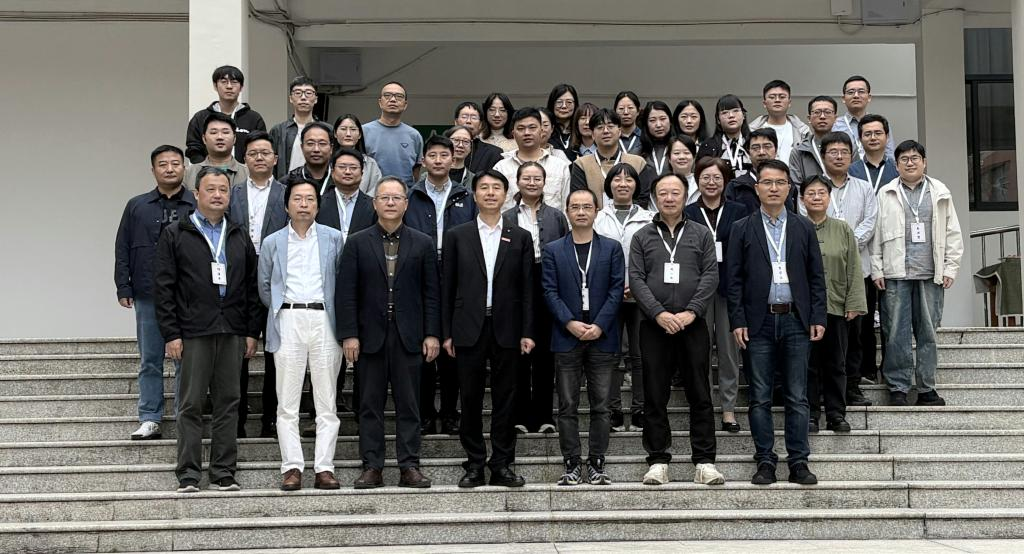The academic seminar on “Cartographic Culture of Scenic Mountains and Rivers from the Perspective of Image-Based History” was held at Taizhou University from October 25 to 26. Professor Li Jianjun, Vice President and Member of the CPC TU Standing Committee, attended the opening ceremony and delivered a speech. The opening ceremony was presided over by Song Xueli, Director of the Department of Ancient Cultural History at the Institute of Ancient History, Chinese Academy of Social Sciences, and Deputy Editor-in-Chief of the journal Image-Based History. The closing ceremony was presided over by Professor Zhong Chong, Director of the Institute of Ancient Texts and Documents, Shanghai Normal University.

A scene of the seminar
In his speech, Professor Li Jianjun pointed out that maps are not merely geographic representations, but also visual expressions of civilizational memory, historical narrative, and cultural identity. He noted that current research in image-based history is increasingly becoming an important platform for interdisciplinary exchange, and that the study of maps focusing on scenic mountains and rivers exemplifies the integration of historical geography, iconography, and cultural history. Professor Li expressed the hope that this seminar would serve as an opportunity to strengthen academic exchange and collaboration, advance the disciplinary integration and methodological exploration of cartographic culture studies, enrich the historical cartographic connotations of the “lucid waters and lush mountains” concept, enhance the empirical research and theoretical interpretation of traditional Chinese landscape culture, and promote the digital annotation, spatial reconstruction, and visual representation of historical resources. He further highlighted the importance of incorporating more high-quality materials into open-access platforms, so that the spirit of traditional landscapes can undergo creative transformation and innovative development in the new era.
Mr. Song Xueli noted that the purpose of this seminar is to place cartographic culture as a central visual medium, employing the methodology of image-based history to promote empirical research and theoretical interpretation of the unique characteristics, evolutionary mechanisms, and historical transformations of fine traditional Chinese culture, while further enhancing interdisciplinary academic exchange and cultural dialogue.
Professor Luo Zhengming, Dean of TU’s School of Humanities, affirmed the positive significance of this seminar for the discipline development, scientific research, and talent cultivation of the school. He emphasized that the scholarly wisdom and intellectual energy gathered at this event will provide strong impetus for the ongoing compilation of the Comprehensive History of Taizhou, and will also offer a solid theoretical foundation and methodological reference for the in-depth exploration, collation, and promotion of Taizhou’s rich historical and cultural resources, thereby enhancing the city’s cultural soft power.
Professor Zhong Chong highlighted the importance of visual materials in historical research, underscoring the cutting-edge position of historical cartography in academic development, and shared perspectives on emerging trends in historical cartography.
Participating scholars and experts explored multiple thematic directions, including cartographic philology, cartographic iconography, historical geography of maps, maps and landscape history, and maps and architectural history. Focusing on historical-geographical subjects such as Tiantai Mountain, Mount Huangshan, the Grand Canal, Mount Wutai, Ningbo, and Kunshan, they examined the multifaceted relationships between maps and textual sources, landscapes, architecture, and social space, demonstrating the multidimensional approaches and interdisciplinary achievements of cartographic culture research from the perspective of image-based history.
At the closing ceremony, Professor Zhong Chong fully affirmed the significance of the seminar in expanding academic frontiers and promoting interdisciplinary research, and expressed the expectation that cartographic culture studies will continue to deepen and yield abundant results in the future.

Group photo of experts at the seminar
The seminar was jointly organized by the Special Committee on History of Sino-Foreign Cultural Exchange of the Chinese Society for the History of Sino-Foreign Relations, the Editorial Office of the journal Image-Based History, the School of Humanities at Shanghai Normal University, and the School of Humanities at Taizhou University. Dozens of scholars and experts from institutions including the Chinese Academy of Social Sciences, Peking University, Shanghai Normal University, Renmin University of China, National Library of China, Zhejiang University, Fudan University, Beijing Forestry University, Tongji University, Tianjin University, Chongqing University, China Academy of Art, Fuzhou University, Xi’an University of Architecture and Technology, Shaanxi Normal University, Ningbo University, Ningbo University of Finance & Economics, and Taizhou University gathered to jointly discuss the documentary sources, visual characteristics, geographic imagery, and cultural spaces of cartographic representations of scenic mountains and rivers.